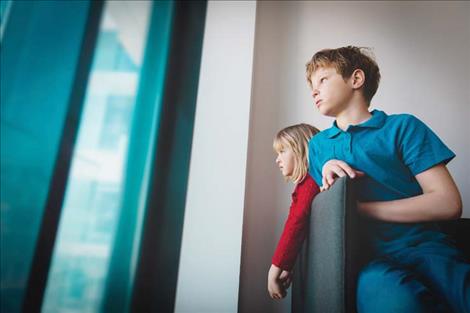It’s not just adults who are stressed - kids are too
Identifying your child’s emotional and behavioral reactions to stress is crucial, experts say, especially when anxieties are high
Hey savvy news reader! Thanks for choosing local.
You are now reading
1 of 3 free articles.
Families are under an extraordinary amount of pressure right now, and the next few months will provide little relief. The trials of 2020 include economic uncertainty, winter dread, an emotionally charged presidential election and a worrying rise in coronavirus cases. Then there’s the disrupted school year, remote learning and few (or no) options for child care. (That’s an abbreviated list.)
Experts are understandably concerned about how all of this might be affecting kids’ mental and behavioral health. In October, the American Academy of Pediatrics released new clinical interim guidance on how to support the emotional needs of children during the pandemic, emphasizing the vital role parents can play.
“Even in the midst of very trying times, there are ways to promote resilience, and families can do that,” said Dr. Carol Weitzman, a developmental-behavioral pediatrician and the co-director of the Autism Spectrum Center at Boston Children’s Hospital who co-authored the academy’s guidelines.
So how can you tell if your kids are stressed, and what can you do to put them at ease? Here are some tips for children of all ages.
Signs of stress and anxiety in young children
It’s easy to assume that young children, and babies in particular, are less susceptible to stress than older kids. But even children as young as 3 months old can sense when their parents are angry or sad, and can feel those emotions themselves, according to Zero to Three, a nonprofit headquartered in Washington, D.C., that educates parents, professionals and policymakers about the developmental needs of babies and toddlers.
If your child’s routines have been disrupted during the pandemic, or if your family is coping with divorce; illness; job loss; problems with mental health or substance abuse; or a death in the family, it’s normal for little kids to experience a regression of skills they had previously mastered. If your daughter is fully potty trained, for example, you might notice more bathroom accidents.
Preschool-aged children may “ruminate on stories of monsters and other dangerous creatures, have difficulties in both sleeping and staying asleep, and report having nightmares,” said Kathleen Mulrooney, the program director for infant and early childhood mental health at Zero to Three. Some preschoolers will become angry if normal activities like play dates or preschool are disrupted, or they might express anxiety and sadness in their everyday play, she added. They might also develop separation anxiety.
Eating habits can change, too. Some kids eat more when they are stressed and others eat less.
Keep in mind that it’s normal for little kids to regress at different points in their development, or to sometimes eat a lot one day and very little the next. And every child becomes more difficult if they are hungry or tired. But if you notice more intense behaviors that make you concerned or distressed — like lengthier, more frequent tantrums, for example — trust your gut and consider getting additional support to help you cope, said Mulrooney.
This might mean consulting with trusted friends or family members who can offer resources or wisdom; or with a pediatrician or other experts who specialize in infant development, depending on the nature of the problem, Mulrooney added.
The ways older kids express stress
Older kids are also struggling right now. In a recent American Psychological Association survey of more than 1,000 teenagers between 13 and 17 in the U.S., 43 percent said that their stress levels have increased over the past year.
When middle schoolers or teenagers are stressed, they might purposely hide their worries because of “fear, shame or a sense of responsibility to avoid burdening others,” according to the A.A.P.
They might also pull away or become hostile or irritable toward their family, withdraw from long-term friends or complain more than usual. And just like younger kids, some teens will cry; sleep too much or too little; or eat more (or less) than usual, said Emma Adam, a professor of human development and social policy at Northwestern University. They might also have trouble concentrating or physical symptoms like headaches, stomachaches or muscle tension, she added.
“You’re looking for major changes in your child’s behavior,” she said.
Another sign of stress, found among both school-age children and teenagers, is negative self-talk.
You want to listen for a lot of “I can’t” statements, said Mary Alvord, a psychologist based in Rockville, Md., and the author of “Conquer Negative Thinking for Teens.”
For example, if your child is struggling to finish a homework assignment, he might say, “I can’t do this, I’m not as smart as the other kids in class.”
Your child might also say negative things about others or their environment: “Everyone is so stupid” or “Nothing here is fun.”
How to help calm your kids
Because infants and toddlers are finely attuned to their parents — reacting to the way they’re held, changes in their daily routine, tone of voice and facial expressions — it’s important to keep your own stress levels in check.
“When parents are stressed and worried, kids become stressed and worried,” Dr. Weitzman said.
(How to cope when you’re feeling anxious.)
Next, think about your child’s personality traits. If your child is typically resistant to change, for instance, try to keep her routines intact as much as possible. Alternatively, if your child tends to take things in stride, you can have more flexibility with her routines, but even she might need extra support at times. Tell her about new situations and activities ahead of time so that she can talk about them with you, Zero to Three advises.
“You can’t change temperament,” Dr. Weitzman said. But, she added, you can change your child’s environment to best meet her needs.
When parents are aware of their children’s needs, their kids “function better, feel better, think more positively and are better able to adapt to difficult circumstances,” Dr. Alvord said.
The experts also said it’s important to ask kids about what’s on their mind. “Expressions of warmth and love and caring from parents still matter,” Dr. Adam said. And so does consistency.
Teens in particular “do their best to drive their parents away,” she added. Don’t let them.
Consider having a weekly check-in to see how everyone in the family is doing. Let your child know that you’re there for them if they want to talk. If they don’t, reassure them that you’re there for them in other ways, even if it’s simply to give them a hug or have family dinner together.
Dr. Adam suggested a sample script: “These are unusual times for our family and for our society, so I think we need time to talk about it. We each experience things differently. So let’s make time every Thursday at dinner to check in with one another.”
If your child is having negative thoughts, focus on helping to reframe their thoughts in a more positive way.
“The thoughts lead to the emotions,” Dr. Alvord said. If your child approaches his homework with a positive thought like, “This is a tough assignment, but I know I can figure it out,” those words will guide the way in which he tackles the problem as well as his outlook and how he feels about himself.
Finally, if your family recently experienced a loss of some kind — the death of a loved one or even something less traumatic but still upsetting, like the absence of play dates — your child might be experiencing grief and will need time to process her emotions. Give her the support and space that she needs.
“Sometimes it’s OK not to feel OK,” Dr. Alvord said. “You just have to sort of sit with the emotions. And that’s where parents can help kids, by listening and validating the feelings.”
This article was reprinted with permission from the New York Times. This and other helpful articles about trauma and children can be found on the ACES website: www.acesconnection.com
















